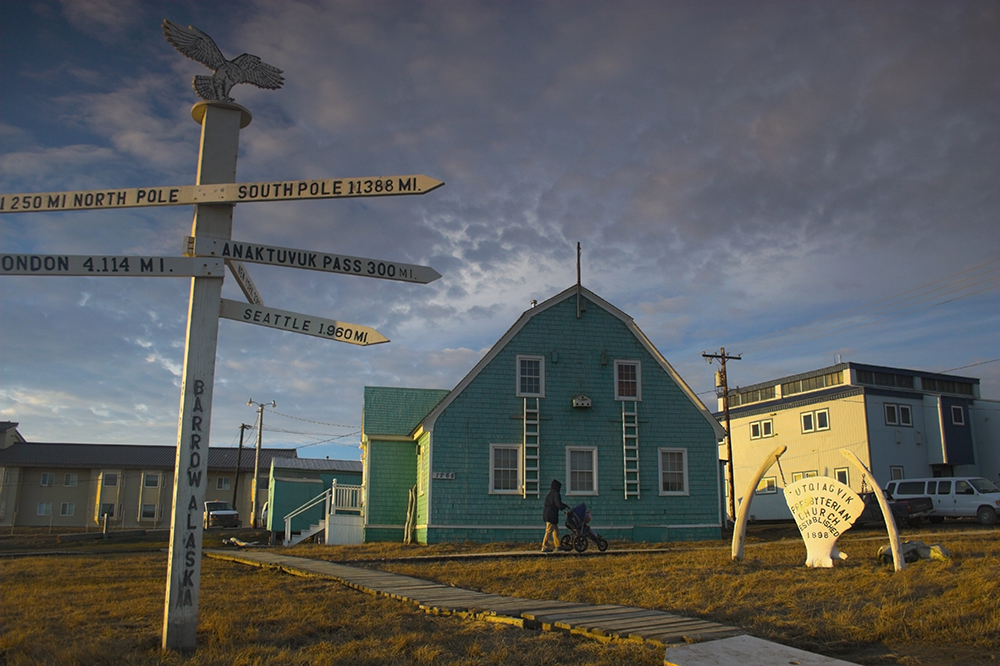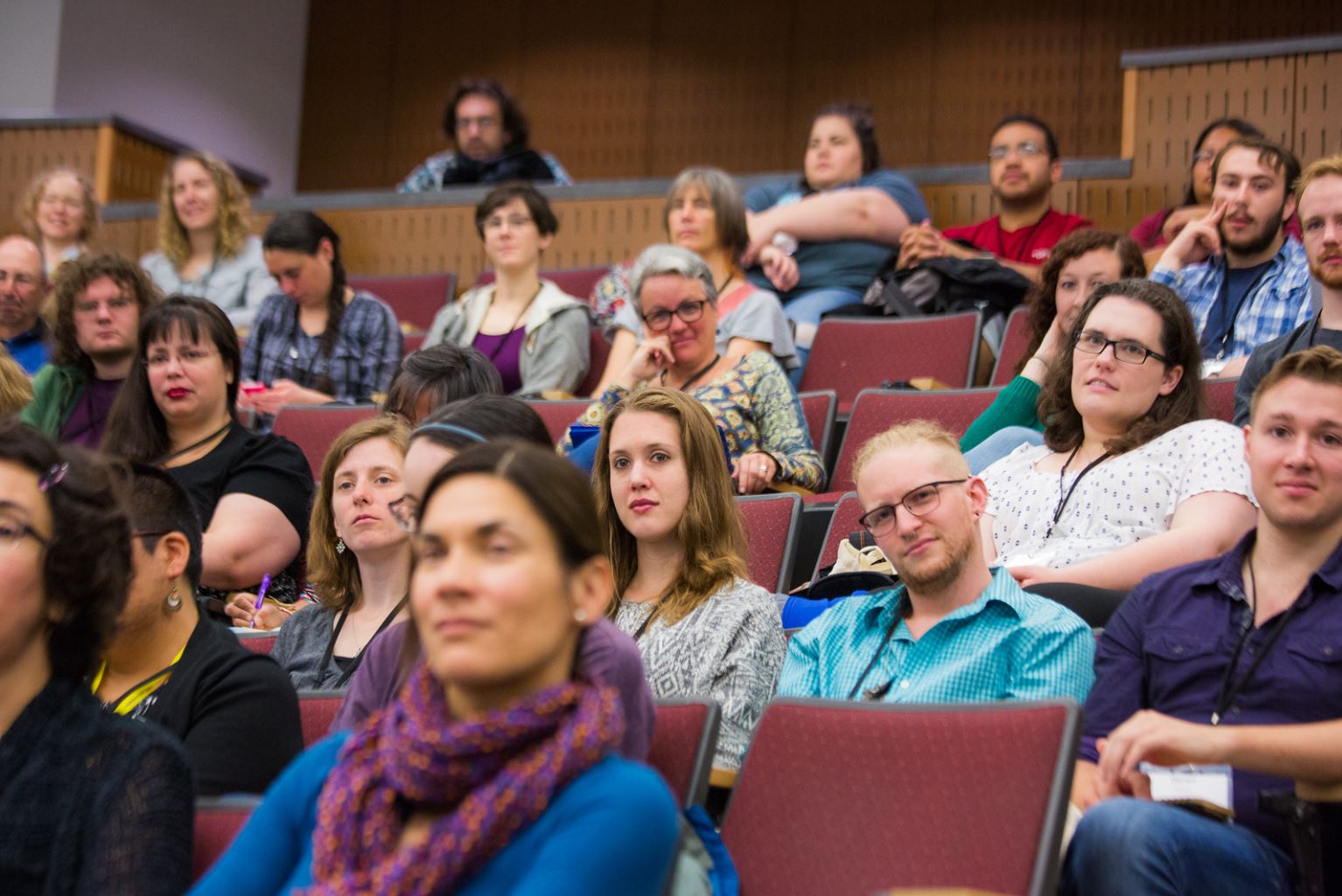Degrees & Programs Offered
Undergraduate Degree Program
The undergraduate degree program seeks to give an overview of the discipline to raise students’ awareness of the many aspects of that uniquely human phenomenon, language
What to Expect in the Undergraduate Program
Students begin with an introductory course to gain familiarity with the discipline and an understanding of the linguistic approach to language study. Students are introduced to the structural analysis of language, including phonology (sounds), morphology (words), and syntax (sentences). The program allows students to explore a number of subfields (e.g., language acquisition/teaching, linguistic anthropology, sociolinguistics) as well as the flexibility to take elective courses outside the program. The program ends with a capstone class in which the students explore and conduct guided research in a subfield of their choice. Majors are required to study two languages, with four semesters in one language and two semesters in the other.

LING F389 Klingon, Elvish and Dothraki: The Art and Science of Language Creation (s)
3 Credits
Offered As Demand Warrants
Exposure to linguistics and linguistic anthropology through inventing a language. The range of human linguistic and cultural variation will inform design of the sound system, grammar, orthography, lexicon and cultural context for the language. The class as a whole will collaboratively create a basic ConWorld, lexicon, grammar and writing system.
If you're already studying language, you may be well on the way to a linguistics degree!
Study two different languages (other than English): 4 semesters of one language and 2 semesters of the second. UAF offers courses in many different languages.
Have you chosen your minor? The very interdisciplinary nature of the College of Liberal Arts means that you have so many options when it comes to tailoring your degree program so that it is just right for you. Here are some minors that students have paired with a B.A. in Linguistics:
Common Minors for Linguistics Majors
Undergraduate Course Descriptions
Offered Spring
Introduction to the field of linguistics as it pertains to the field of education. Includes discussions of language structure, acquisition and bilingualism, and variation and public policy. The course does not satisfy requirements for the B.A. in Linguistics. Cross-listed with ED F100. (3+0)
Offered Fall
The study of language: systematic analysis of human language and description of its grammatical structure, distribution and diversity. Also available via Independent Learning. (3+0)
Offered Fall
Introduction to the field of Teaching English as a Second Language. (1+0)
Offered As Demand Warrants
A comprehensive survey of the world's languages-- past and present. Topics include genetic relationships among languages, linguistic change, language universals, language classification and language families, as well as the interaction of culture and language. (3+0)
3 Credits
Offered Spring
An introduction to the study of the language and culture nexus. Questions addressed include: How does the language you speak affect how you think and view the world? How do ways of speaking structure culture? What do we know about how human language evolved? How does language encode cultural meaning? Prerequisites: ANTH F100X, ANTH F101X, ANTH F215, SOC F101X or LING F101X. Cross-listed with ANTH F260. (3+0)
Offered Spring
Central issues in second language acquisition research. Includes a critical review of SLA theories and research. Prerequisites: LING F101; or permission of instructor (3+0)
Offered As Demand Warrants
Theories of the acquisition and development of first and second languages, including consideration of biological and sociocultural factors. Survey of traditional and contemporary theories, and implications for pedagogy and public policy. Recommended: LING F101. Cross-listed with ED F303. (3+0)
Offered Fall Odd-numbered Years
Examination of relationships between language and gender, drawing on both ethnographic and linguistic sources. Topics include power, socialization and sexism. Prerequisites: COMM F131X or COMM F141X; ENGL F111X; ENGL F211X or ENGL F213X or permission of instructor. Cross-listed with ANTH F308; WMS F308. (3+0)
Offered Spring
Scientific study of human speech sounds, mechanism of their production, and sound systems of languages. Prerequisites: Upper-division standing or permission of instructor. (3+0)
Offered Fall Even-numbered Years
Study of principles and processes of word construction in language. Morphological structure of Alaska Native languages and other non-Indo-European languages. Prerequisites: LING F318 or permission of instructor. (3+0)
Offered Spring
Theory and practice of teaching a second language, including methodological approaches, second language acquisition theory, materials and testing. Prerequisites: COMM F131X or COMM F141X. (3+0)
Offered Fall Even-numbered Years or As Demand Warrants
This class uses "hands-on" discourse analytic techniques of student-collected media data in order to examine whether or not there is a unified rhetorical style associated with the American Right; the nature of the relationship between a message, its form and persuasion; and how moral stance are taken in political contexts. Evaluation of the veracity, ethical or historical merits of conservative political stances is not part of the scope of this course. Prerequisites: COMM F131X or COMM F141X; ENGL F111X; ENGL F211X or ENGL F213X. (3+0)
Offered As Demand Warrants
An elective course in linguistics for majors. Content will vary from year to year and may be drawn from many areas of linguistics to include current research and methodologies. Course may be repeated two times for credit when content varies. Prerequistes: LING F101, LING F318 and LING F320 or permission of instructor. (3+0)
Offered Fall Even-numbered Years
Consideration of minority languages, including Alaskan Native Languages, in light of their histories, current status and factors affecting future maintenance. Prerequisites: COMM F131X or COMM F141X. Stacked with LING F650. (3+0)
Offered Spring Odd-numbered Years
Current issues in various subfields of linguistics including semantics and pragmatics, discourse analysis, bilingualism, lexicography, language philosophy and issues within a particular language or language group, e.g. Eskimo phonology, Athabaskan morphology. May be repeated once. (3+0)
Undergraduate students are welcome to take graduate level courses with special permission.
Ready to apply?
Graduate Degree Program
Welcome to UAF's Master of Applied Linguistics Program
UAF’s MA in Applied Linguistics allows you to specialize in one of two areas: Second Language Acquisition Teacher Education (SLATE) and Language in Society.
Second Language Acquisition Teacher Education (SLATE) provides a theoretical and practical foundation in second language teaching, language teaching, materials development and language assessment.
All graduate students regardless of concentration are required to take LING F600- Research Methods for Applied Linguistics, LING F602- Second Language Acquisition and LING F650- Language Policy and Planning as well as three electives. An additional two courses in the student's chosen concentration is also required.
**Please note, the requirement for LING F601 is discussed on an individual basis during advising.
Further coursework is determined by the student’s choice of concentration and in consultation with their committee. For more information, please contact our program.
Graduate Course Descriptions
3 Credits
Offered Spring
Review of quantitative and qualitative research paradigms, data gathering techniques
and analytical tools (questionnaires, surveys, observations, testing) used in the
study of applied linguistics. Topics will include ethical issues in human subjects
research, how to conduct a literature review, how to conduct classroom-based research.
Prerequisites: Graduate standing. (3+0)
3 Credits
Offered Fall Odd-numbered Years
Provides experience in working with various languages to determine systematic principles
of transcribing and organizing sounds; isolating morphemes; categorizing words into
semantic categories; and understanding narrative and other rhetorical structures.
For students whose specialty is other than linguistics who could benefit from a graduate-level
introduction to linguistic methods. (3+0)
3 Credits
Offered Fall
Central issues in second language acquisition research. Includes a critical review
of SLA theories and research. Prerequisites: LING F101 or LING F601; graduate standing;
or permission of instructor. (3+0)
3 Credits
Scientific approach to the study of human speech sounds and the mechanism of their
production (phonetics), as well as the exploration of the fundamental concepts of
the sound systems of languages (phonology) and theories which allow for the analysis
of real language data. (3+0)
3 Credits
Offered Fall Even-numbered Years
The study of how meaning is encoded in words in languages of the world. Morphological
and morphophonemic processes, lexical categories, derivation and inflection, productivity,
tense, aspect, mode, case, concord, valence changes, morphological typologies. Similarities
and differences among languages in the grammatical devices used to signal relations
between nouns and verbs, negation, comparison, attribution. Prerequisites: LING F101
or LING F601; graduate standing; or permission of instructor. (3+0)
3 Credits
Offered Spring
Theory and practice of teaching a second language, including methodological approaches,
second language acquisition theory, materials, and testing. (3+0)
3 Credits
Offered Fall Even-numbered Years
Exploration/discussion of theoretical perspectives in Second Language curriculum and
materials development. Emphasis on the interconnectivity of materials, syllabus, curriculum
and learning. As a result of this course, students will be able to choose, adapt and
construct a variety of language teaching materials and understand the ramifications
of syllabus and curriculum design. Recommended: LING F601. (3+0)
3 Credits
Offered Fall Odd-numbered Years
Consideration of minority languages, including Alaska Native Languages, in light of
their histories, current status, and factors affecting future maintenance. Stacked
with LING F450. (3+0)
3 Credits
In-depth investigation of linguistic problems in selected languages. Includes phonological,
morphological, syntactic and semantic issues. Students will produce a grammatical
sketch of a chosen language. Prerequisites: LING F318; LING F320; LING F601; or relevant
course work. (3+0)
3 Credits
Offered Fall Even-numbered Years
Student works as an apprentice to a language teacher or a linguist doing fieldwork.
Maintain a log and a portfolio of work. If teaching, goal would be to develop appropriate
lesson plans and do mentored teaching. If doing fieldwork, goal would be to develop
appropriate materials for teaching. Prerequisites: LING F603; LING F604; ANTH F632
or LING F610. (3+0)
Ready to apply?
BA to MA Program
Complete your BA and MA in 138 credits.
UAF’s Accelerated MA in Applied Linguistics facilitates a deep dive into SLATE with a strong undergraduate curriculum in language acquisition and teaching as well as an intense graduate experience in theory, practice and research. It provides the necessary tools to teach in language classrooms, both at home and abroad, or enter the Ph.D. program of your choice.
What does accelerated mean?
Bachelor of Arts
- 120 credits
- 4 years of coursework
Master of Arts
- 30 credits
- 2 - 3 years of coursework + 1 year of research
Accelerated B.A. to M.A.
- 138 credits
- 5 years of coursework + 1 year of research
See more about the Accelerated B.A. to M.A. Program:
Ready to apply?
Ph.D. in Interdisciplinary Studies
Faculty in the UAF Linguistics Program are able to offer advanced students the possibility of a Ph.D. in Interdisciplinary Studies with a concentration in Linguistics.



